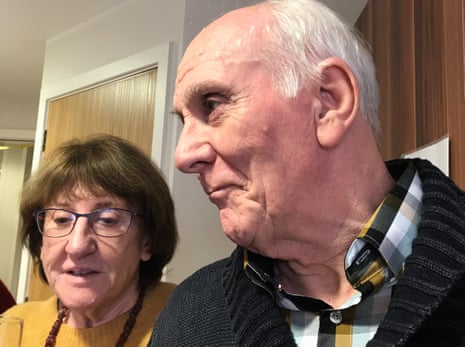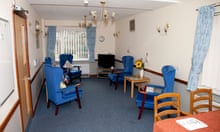“There is no joy in the air,” said Anne Thompson, describing the impact of the national care staff crisis on her husband’s Harrogate care home. “There’s no sense of companionship.”
On a recent visit to see Michael, 80, who used to run a steel fabrication company and loved mountain climbing and classical music, she found him looking miserable with his head drooping.
He was quickly restored with a hug, but the stretched staff have little time for such emotional care, said Anne, who said the situation has taken her to “extremes of anger, bitterness and despair”.
“Before the pandemic the staff had time,” she said. “Now they do their best but it’s not good enough any more. They don’t have the time to talk to the residents, hug them, communicate with them. The care is fragmented.
“A lot of agency staff are being used [because rising Covid infections in the community means more permanent staff isolating]. The sense of community they used to have has all but vanished.”
Vida Hall, the care home where Michael has lived for more than six years, is far from the worst in the country. In fact, the latest Care Quality Commission (CQC) report ranks it “outstanding”, as perhaps it should be for a facility that costs £1,600 a week.
In homes inspected recently by the CQC that it rated as “inadequate”, residents have been left in danger of choking, uncleaned and shut in their rooms. But while Anne says staff attend to her husband’s physical needs, even in such a well-funded environment they have to move on after brief interactions.
In the 28 days from mid-June to mid-July, she said he had only been out of his room four times. Michael, her partner for more than 50 years, with whom she used to climb in the Bavarian Alps and Italian Dolomites, has lost the habit of walking and, she said, is now “frightened to walk”.
“The staff can’t help him because they don’t have the time,” she said. “They haven’t got enough staff.”
James Rycroft, managing director at Vida Healthcare, said the firm was “saddened to hear Anne’s feedback and we are working very closely with her to make sure that the care we’re providing Michael is helping him to stay happy and healthy.”
He said the firm had increased pay by 30%, had recruited 120 new staff since January – with more joining soon – and supports staff to give residents “the physical and emotional care they need”.
“We also regularly review our staffing ratios for each resident to enable us to go above and beyond their minimum care requirements and meet their unique needs successfully,” he said.
At another care home in West Yorkshire, a daughter, who asked not to be named, described how her 93-year old mother’s teeth were not being cleaned because of staff problems. Some are falling out and her false teeth have gone missing.
The door from her room to the garden is locked, which exacerbates her claustrophobia, and on several occasions she has lost her emergency buzzer worn around her wrist or neck.
“Since Covid, I feel there has been a lack of care and lack of attention to detail,” she said. “It may be they are battle-weary, burned out and exhausted. I can empathise with that. But my mum has a history of falling and if she doesn’t have her call button … As a family, you want assurances that wherever you place your loved one is safe.”
Neil Russell, who runs three neurological care homes in Peterborough and Milton Keynes, is short of 30 staff – a problem that started with Brexit, when many workers from the EU left because they felt “unwanted”.
“The staffing issue began with Brexit and it got worse with the pandemic,” he said. “It has just tired people out, it has left people exhausted.”
A Covid outbreak in June led to 20 staff being placed in isolation at home for a week. “There is no wriggle room and it puts pressure on the existing staff,” Russell said. “They end up working too many shifts.”









